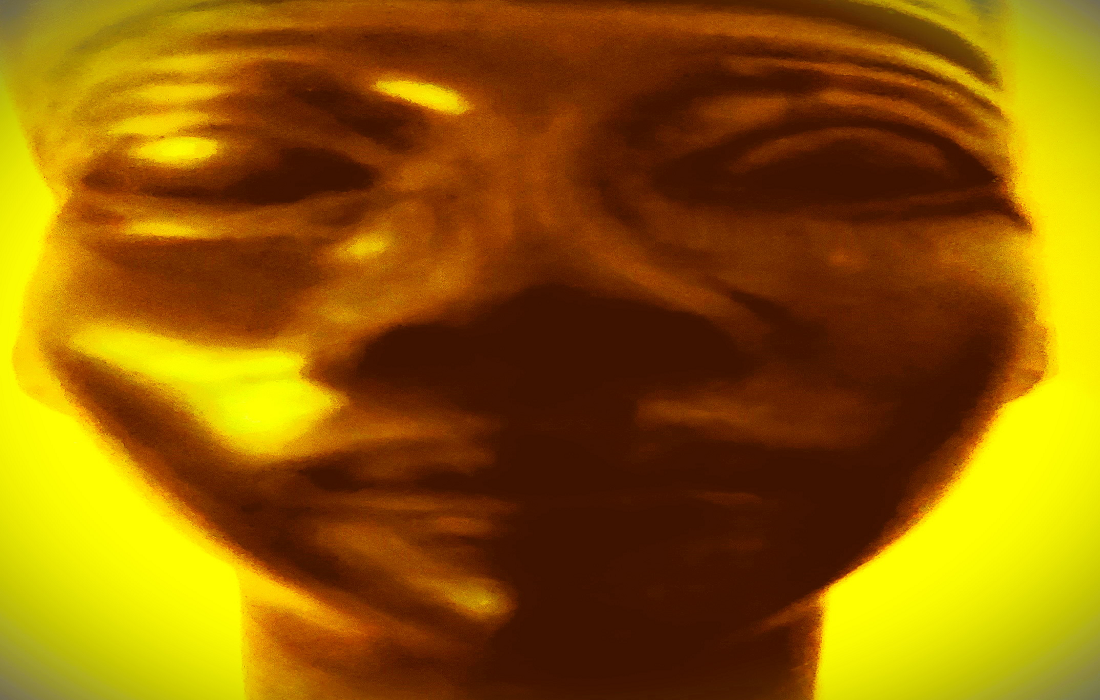

Photo: A. Elmi
Jesus' Carving (2/6)
By: A. Elmi
17th of November 2022
Maryan was very fond of screens of various kinds, which is to say that she liked anything she could hide behind, from a door to a human back to a blanket. For no sooner did a door close her into an empty room or someone turn their back to her than she would relax and smile and do whatever it was she usually did. It was hard to say exactly what she did during the days, except try her hand at cooking and failing each time, because seeing her you couldn’t have guessed at it and speaking to her you’d rarely elicit a reply. Although her behaviour was comparable to a thief’s in many ways, I believe she was simply more comfortable doing things secretly. Maybe she was one of those people who couldn’t handle the pressures of social interactions and could only think, speak, and act freely when alone. I often wondered what her full voice sounded like, and also why she favoured tattered dresses when she had the option to wear new ones. Everything, from her silence to the clothes she wore, begged you not to look at her, to pretend she wasn’t there, so she could live and breathe unbothered by people and their demands. But, of course, this wasn’t possible at all. She was Grandfather Kaahin’s primary carer. For obvious reasons, we had to talk with her and get to know her, know he was safe with her. And though Grandfather vouched for her character, none of us really knew enough about her to say for certain that she was this kind of person or that. It made all of us, save Grandfather, guarded and more than a little mistrustful.
For these reasons, I was sprinting through the hard rain down the road to Maashaven Station hours later to meet up with Mum and my two brothers. They were huddling together inside the station, waiting for me, waiting to start our secret meeting.
‘She burned Awoowe’s food again,’ I panted at them as they shifted a little to make room for me in their circle.
Mum inched closer, her right shoulder touching my left. ‘Did you feed your Awoowe?’ she asked me, her hands grabbing for mine.
I took her hands and smiled at her calmingly. ‘I did. And I made boxes of food for Maryan to heat up in the microwave for him tomorrow and the day after.’
My oldest brother, Xirsi, scoffed. ‘Well, let’s hope the mute doesn’t burn that too.’
‘Does she even know how to work a microwave?’ my youngest brother, Idris, asked.
‘I’ve shown her plenty of times,’ I said, letting go of Mum’s hands, ‘but she seems a bit slow.’
‘I’ll have a neighbour come round to help her, then,’ Mum said tiredly. ‘This can’t go on forever,’ she went on. ‘Your Awoowe is a diabetic. His health depends on regular, well-cooked meals.’ The hiss and patter of the rain filled her ensuing silence, and her eyes went gradually distant. ‘But it doesn’t look like I have much of a choice but to train her,’ she said eventually, resigned and unlike herself.
‘We can’t train someone who doesn’t speak, though,’ Idris commented, but it was as much criticism as observation. And maybe that was why he took the edge off his words, making his voice soft and gentle. He watched Mum until she became aware of him and met his gaze, her eyes becoming alert. ‘Awoowe swears she could cook back home in Ethiopia,’ he continued with a full voice, ‘but now she burns every single food she touches. So, is the problem that she can’t cook or that she won’t? What if she burns the food intentionally? Whatever it may be, she won’t tell us because she won’t speak to us. So, we should send her away before something bad happens to Awoowe.’
Mum watched him for another moment, her face unreadable, then turned to me. ‘Safia, dear, you’re the only one Maryan speaks to. If anyone knows why she burns the food, it’s you.’
I started to nod in agreement but then broke off to grimace hesitantly. ‘Well, she told me she doesn’t know why she does it.’ My eyes narrowed in sudden recollection. ‘But then, after a while, she smiled.’
‘She smiled?’ Mum echoed, shocked. She looked across at Idris again. ‘Maybe we should send her away.’
‘How?’ Xirsi asked us all.
My mind had already travelled back to the smile, and it was a small leap from there to our conversation about her mysterious fiancé. ‘I have an idea,’ I said, instantly earning everyone’s attention. ‘She’s involved with some man. She doesn’t know his name, or she won’t tell me, and she’s never met him in the eleven years they’ve been talking, or so she tells me. But here’s the thing: they’re engaged now. When she marries him . . .’ I trailed off and swept my eyes over them meaningfully.
Idris’s face brightened up. ‘When she marries him, she’ll leave.’
Mum nodded and then clapped her hands together once. ‘Listen closely, now! We have to speed this marriage along. Safia,’ she said, looking at me, ‘talk with her some more about this man and tell her we’re happy to arrange the wedding and anything else she might need help with. Our goal,’ she continued, ‘is to get her out within two months, at most three.’
‘Haye, Hooyo, Okay, Mother.’
About the only thing that was harder than getting Maryan to volunteer some words was perhaps finding her. She was like one of those wily little flies that has a way of disappearing the moment you try to catch it and reappearing only after you’ve returned the swatter to the cabinet. Our house wasn’t ideal for a game of hide-and-seek. It wasn’t big, cluttered, or adapted with hideouts, and yet she’d found a way to vanish inside it, either camouflaging against something, like that ring of hers, or hiding in one of those air pockets where she kept her thoughts. Just as with her speech, you had to wait, wait, wait until she was ready for you.
Even if I could find her and make the offer this evening, I doubted we could send her away anytime soon. For if there was one thing I knew about her for sure, it was that Maryan would leave in her own time. She did everything at her own pace and on her own terms, and Grandfather was the first witness to this behaviour. His private chauffeur had just narrowly skirted a collision on Meskel Square, the wildest intersection in the world, and Grandfather was slumped in the back wiping sweat from his brow. The car had been stationary for about ten wild heartbeats when a skinny, grimy child threw the door open and scrabbled up onto the seat next to Grandfather. She closed the door shut and locked it, then stiffened into a statue. As though she were an actual statue, no one and nothing could move her so that she was fixed as firmly as ever even as the car pulled up hours later in the driveway of his Addis Ababa home. That was when the girl-statue regained life for a flickering instant, launching herself from the car and into his garden where she turned into a sort of gnome. When she wasn’t doing this, she’d drift about in his garden staring around at everything or nothing or pass in and out of the house, conjuring up wonderful meals, scrubbing things clean, and predicting Grandfather’s needs. She would bury her bare feet in the garden soil and pile stones over them whenever Grandfather so much as hinted it was time for her to leave. She clung to him for the next twenty years and transformed from intruder to adopted daughter, caring for Grandfather in exchange for food, shelter, and pocket money. And it was in this last role we welcomed her together with Grandfather to our home in Rotterdam last year.
I was about to turn in for the night when I heard soft footfalls in the hallway outside my bedroom. I stuck my head out and saw a stocky shape disappearing into Grandfather’s room. I followed it and saw Maryan slipping into her mattress at the foot of Grandfather’s bed and blanketing herself from head to toe. I made to approach her, hoping that a person such as she who hid and whispered might feel more comfortable talking in the dark. Perhaps she could convince herself she was talking to the empty air and speak more freely. I froze partway to her mattress at the light shining through her covers. The light angled towards her ear before it attached to it. Before long, whispers, pitched to carry to the mobile glued to her ear, trickled out through the covers. I stood in the dark straining to catch any semblance of words until my yawns grew and almost cracked my jaws.


